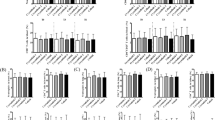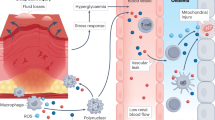Abstract
IN treating secondary shock, the intravenous route of fluid administration may not be possible under certain conditions, as, for example, in small infants or in the event of a catastrophe when sufficient trained personnel are not available. In lieu of the intravenous route, the interstitial administration of fluids containing hyaluronidase to assist assimilation has been used clinically in recent years1. With the addition of this enzyme to break down hyaluronic acid, the fluid spreads more rapidly throughout the connective tissue, thereby entering the capillaries more rapidly, with a consequent increase in the effectiveness of the shock therapy.
This is a preview of subscription content, access via your institution
Access options
Subscribe to this journal
Receive 51 print issues and online access
$199.00 per year
only $3.90 per issue
Buy this article
- Purchase on Springer Link
- Instant access to full article PDF
Prices may be subject to local taxes which are calculated during checkout
Similar content being viewed by others
References
Burket and Gyorgy, Ann. N.Y. Acad. Sci., 52, 1172 (1950).
Author information
Authors and Affiliations
Rights and permissions
About this article
Cite this article
ROSENBERG, E., McCOMB, C., FARMER, A. et al. Effect of Hyaluronidase on the Mortality from Experimental Burns. Nature 171, 431–432 (1953). https://doi.org/10.1038/171431b0
Issue Date:
DOI: https://doi.org/10.1038/171431b0
Comments
By submitting a comment you agree to abide by our Terms and Community Guidelines. If you find something abusive or that does not comply with our terms or guidelines please flag it as inappropriate.



